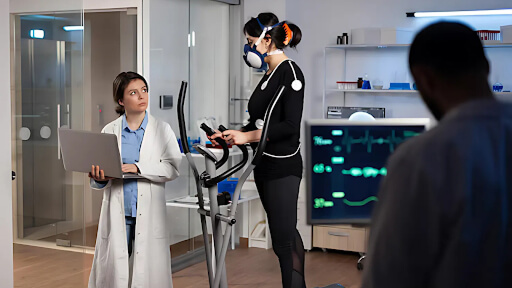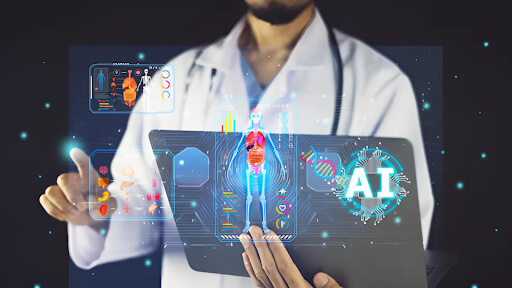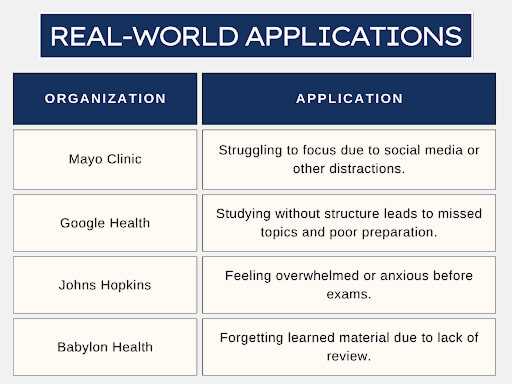 1-800-805-5783
1-800-805-5783 
Healthcare is complex. Between overloaded doctors, long wait times, and an overwhelming amount of patient data, the system often feels like it’s playing catch-up. That’s where Agentic AI in healthcare has stepped in to help, handling routine tasks and supporting decision-making.
But now, a new kind of AI is emerging — one that doesn’t just follow instructions but can think, plan, and even act with intent. This is Agentic AI in healthcare, and it’s opening up powerful possibilities in the way healthcare is delivered.
From being helpful assistants to becoming intelligent, adaptive partners in care, Agentic AI in healthcare is moving the industry from automation to genuine autonomy, and patients are beginning to feel the difference.

Agentic AI surpasses traditional AI systems, which rely on clear input to produce output. These newer systems are goal-driven, meaning they can identify problems, generate solutions, make decisions, and then act — all with minimal human intervention.
Think of it this way: traditional AI might help a doctor spot patterns in lab results. Agentic AI in healthcare, on the other hand, could identify those same patterns, predict future risks, suggest treatments, schedule follow-ups, and keep the care team informed — all independently.
It’s like giving healthcare providers a proactive digital teammate that can think ahead, learn on the job, and respond to changes in real time.
A recent multimodal AI agent in oncology achieved:
Think of it like an AI resident — one that never sleeps and continuously learns on the job.

Recent industry snapshots show a dramatic impact in healthcare:
Moreover, one report projects that Agentic AI in the healthcare market will grow from $4.96 billion in 2023, with a compound annual growth rate (CAGR) of 45.6%.

Healthcare is messy. Patients don’t come with one-size-fits-all problems, and treatment rarely follows a straight line. Things change fast. That’s why having an Agentic AI in a healthcare system that can adapt on its own is a game-changer.
Agentic AI can be applied across various layers of healthcare, including personalized care and research, as well as hospital logistics and patient monitoring. It brings speed, intelligence, and adaptability to areas that often move too slowly.
Let’s look at some real ways it’s making an impact.
Every patient is unique. Agentic AI is capable of pulling in and interpreting data from multiple sources, including electronic health records, lab results, wearable devices, and even genomics, to build a comprehensive, real-time picture of a patient’s condition.
Then it does something amazing: it reasons through that information to suggest tailored treatments or raise red flags early.
Real-world scenario: An AI agent helps monitor a diabetic patient by analyzing glucose levels, diet logs, and medication history. When it notices patterns that signal a risk of hypoglycemia, it can recommend adjustments — even before the doctor checks in.
This isn’t just helpful. It’s potentially life-saving.
One of the most significant issues in healthcare today is that problems often escalate before they’re detected. Agentic AI in healthcare changes that work behind the scenes 24/7 — analyzing real-time data from devices like smartwatches, heart monitors, and sleep trackers.
Imagine this: A patient recovering from surgery at home starts showing signs of infection. An AI agent notices the change in vitals, cross-checks it with the patient’s recovery plan, sends an alert to the care team, and helps schedule a visit — all before things get worse.
This level of proactive care could significantly reduce hospital readmissions and emergency interventions.
The medical world is drowning in data. Every week, new research papers are published, new trials are completed, and new guidelines are released. But no human—not even the best-trained specialist—can keep up with it all.
Agentic AI in healthcare can. It can read, summarize, and extract insights from massive volumes of medical literature, making recommendations based on the most up-to-date knowledge.
Whether it’s helping a cancer researcher understand how a drug performs across genetic profiles or summarizing the latest findings on long COVID, Agentic AI in healthcare acts like a hyper-efficient research assistant.
Healthcare is more than just medicine — it’s also about logistics. From managing appointment scheduling to tracking supply chains, there are hundreds of moving parts.
Agentic AI in healthcare can assist with all of it. Do you need to coordinate a care plan between departments? AI can handle the scheduling and documentation. Need to find inefficiencies in ER operations? AI can analyze workflows and offer data-driven suggestions.
This reduces the burden on staff, speeds up service, and ultimately means more time spent with patients rather than on paperwork.
Cloudera reports that administrative AI agents are reducing clinical documentation by 40% and boosting patient outcomes by 35%.

Agentic AI doesn’t just follow rules. It learns and adapts. That’s what separates it from old-school automation. Here’s what makes it unique:
Organizations around the world are already using Agentic AI in healthcare in different ways:
These aren’t isolated experiments. They’re signs of where the whole industry is heading.

The technology is powerful, but like any powerful tool, it must be used responsibly.
Picture this: It’s 2030. A rural clinic has no on-site specialists, but a local nurse works with a team of AI agents. A patient walks in. One AI reviews its history. Another handles diagnostics. A third agent connects with a city-based doctor for a live consultation.
All of this happens smoothly, securely, and affordably.
That’s the promise of Agentic AI in healthcare — not replacing humans, but amplifying them, giving more people access to quality care, faster interventions, and better outcomes.

Healthcare doesn’t need more tools. It needs smarter partners — systems that don’t just help, but honestly think, act, and adapt. Agentic AI in healthcare is that kind of partner.
As we move from automation to autonomy, one thing remains clear: the future of healthcare isn’t machine vs. human. It’s human + machine, working together to deliver care that’s faster, fairer, and more personalized than ever.
Q1: What is Agentic AI in healthcare?
It’s AI that can act independently to assist in clinical decision-making, patient monitoring, and care coordination.
Q2: Will it replace doctors?
No. It’s built to support them — to help with routine tasks, research, and real-time insights.
Q3: Is it being used now?
Yes. Major hospitals and research centers are already running pilot programs using Agentic AI.
Q4: Is it safe?
It can be, with proper oversight, data privacy protections, and ethical safeguards.
At [x]cube LABS, we craft intelligent AI agents that seamlessly integrate with your systems, enhancing efficiency and innovation:
Integrate our Agentic AI solutions to automate tasks, derive actionable insights, and deliver superior customer experiences effortlessly within your existing workflows.
For more information and to schedule a FREE demo, check out all our ready-to-deploy agents here.